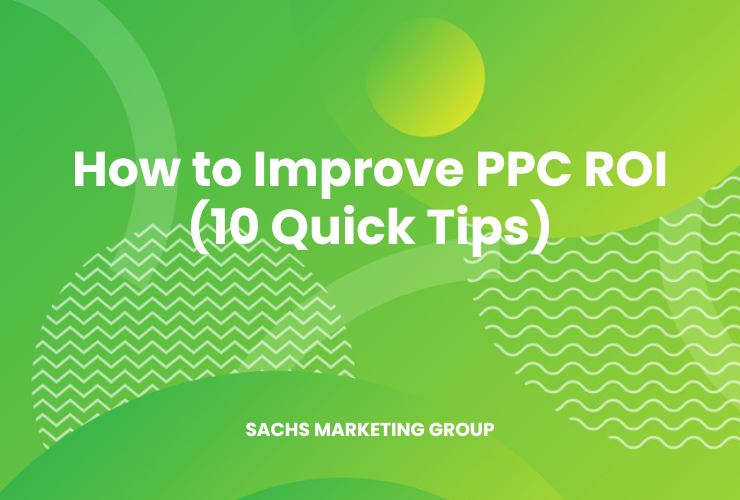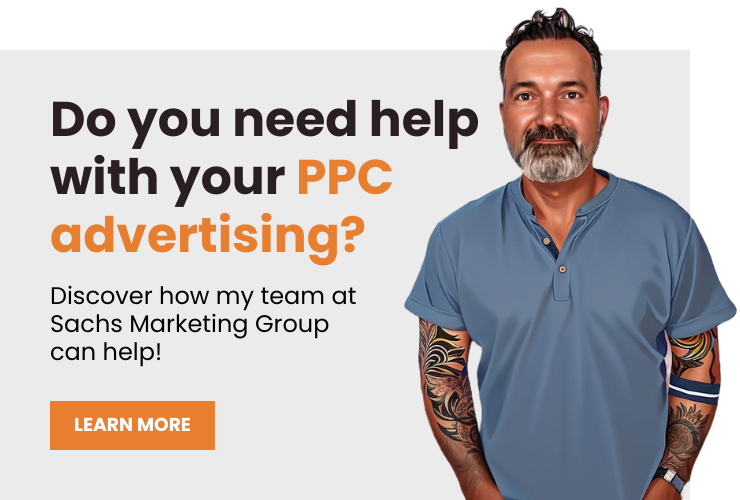To improve your PPC ROI, focus on keyword optimization by using exact match and negative keywords. Employ ad extensions and ensure your ad copies include targeted keywords. Boost your Quality Score by creating relevant and valuable ads. Also, customize when your ads run, create targeted landing pages, and continuously track and optimize using data. Consider working with a PPC expert for specialized insights and strategies.
Are you tired of seeing a low return on investment from your pay-per-click (PPC) advertising campaigns?
The frustration can be immense when your efforts do not yield the desired return on investment (ROI).
We’ve gathered several tips to help you understand how to improve PPC ROI so you can rest assured your advertising budget is generating a profitable return.
In this article, you will discover 10 tips that will help you improve your PPC campaigns and return on investment.
Overview
How to Improve PPC ROI
As a business owner, making the most out of your PPC campaigns is crucial for generating a high return on investment. But with the ever-evolving landscape of digital advertising, it can be challenging to know which tactics to employ.
If you’re new to PPC advertising and you’re not sure where to start, check out these 10 types of Google ads and these 16 PPC advertising tips for small businesses to kick-start your knowledge.
Below is a list of tried-and-true tips that will empower you to effectively optimize your campaigns and significantly improve your PPC ROI.
Okay, let’s dive into how to improve PPC ROI for your business …
1. Use exact-match keywords
Exact match keywords are a powerful tool in PPC campaigns, as they allow you to precisely target search queries that are an exact match to the keywords you’re bidding on. This ensures that your ads are only shown to users who are explicitly searching for what you offer, resulting in more qualified leads.
For example, if you’re selling handmade wooden chairs, using the exact match keyword [handmade wooden chairs] would only show your ad to users who type in that exact phrase.
- Tailor your ad copy to the exact match keyword for better relevancy.
- Monitor the performance closely to adjust bids accordingly.
- Remember that Google considers close variations as exact matches too.
By the way, if you’re a local services provider and want to find qualified local leads, be sure to check out our guide on How to Generate Leads in Google Local Services Ads.
2. Use negative keywords
Negative keywords prevent your ads from being triggered by certain words or phrases that are not relevant to your products. This helps you avoid spending money on clicks that have little to no chance of converting, increasing the effectiveness and ROI of your campaigns.
For example, if you’re selling premium watches, adding “cheap” as a negative keyword ensures that your ad won’t show for search queries looking for cheap watches.
3. Use ad extensions
Ad extensions are a great way to enhance your ads with additional information, giving users more reasons to choose your business. They can include extra links, phone numbers, or additional text. For example, a local bakery could use location extensions to show their address, and call extensions to enable potential customers to call them with one click.
- Use sitelink extensions to direct users to specific pages on your website.
- Add callout extensions to highlight unique offers and benefits.
- Utilize structured snippet extensions to showcase a range of products or services.
4. Improve your quality score
Google rates the quality and relevance of your keywords and PPC ads on a scale of 1 to 10, known as the Quality Score. By optimizing your ads for relevance, providing value, and ensuring a good user experience, you can improve your Quality Score, which generally results in lower costs and better ad positions.
If you own an online store specializing in fitness apparel, and you’re running PPC ads for running shoes, you could improve your quality score by ensuring your ad copy and landing page are highly relevant to running shoes. Additionally, optimizing your site for speed and mobile responsiveness can also improve the user experience, which contributes to a better quality score.
5. Run ads at the right time
Also known as dayparting, this strategy involves running your ads at specific times of the day or days of the week to maximize their effectiveness. By analyzing data and understanding when your audience is most active or receptive, you can allocate your budget more efficiently and improve ROI.
Let’s say run a pizza restaurant in Los Angeles and to maximize your dinner-time orders. By analyzing historical data, you may notice that most orders are placed between 6 PM and 9 PM. With this insight, you can schedule your PPC ads to run during these peak times to maximize visibility and ROI.
6. Use keywords in your ad copy
Incorporate your targeted keywords in your ad copy.
This makes your ad more relevant to the searcher and can result in a higher click-through rate. Be careful to ensure that your ad copy remains engaging and provides value, rather than just stuffing it with keywords.
For example, a company selling organic skincare products should include keywords such as “organic” and “natural skincare” within the ad copy. For instance, “Nourish your skin with our 100% organic skincare products. Natural ingredients for radiant skin.”
7. Create targeted landing pages
Having a well-designed landing page tailored to match the content of your ad is critical. Ensure that your landing page is relevant, contains a clear call-to-action, and provides the information that the visitor is expecting to see when they click on your ad.
A digital marketing agency running an ad campaign for its SEO services directs users to a dedicated landing page about SEO, rather than the homepage. This landing page contains detailed information on SEO services, case studies, and a specific call to action, such as “Get a Free SEO Audit”.
8. Track, test, and use data to optimize
Tracking, testing, and using data to optimize PPC ads is critical for maximizing the ROI of your campaigns. Here’s how you can do it:
- Set Up Conversion Tracking: Use tools like Google Ads conversion tracking or a third-party analytics tool to track the actions users take after clicking on your ads. This can include making purchases, filling out contact forms, or signing up for newsletters.
- A/B Testing: Run two or more variations of your ad to see which performs better. You can change various elements such as the headline, description, display URL, or CTA.
- Analyze Performance Metrics: Regularly analyze key metrics like click-through rates (CTR), cost per click (CPC), conversion rate, and return on investment. This will help you understand which ads are performing well and which ones need improvement.
- Adjust Bids for Keywords: Use data to adjust how much you bid on certain keywords. If a keyword is performing well, you might want to increase your bid to maximize exposure. Conversely, lower bids for underperforming keywords.
- Use Remarketing Lists: Create remarketing lists to target users who have previously interacted with your site but did not convert. Tailor your ad copy to speak directly to these audiences.
- Optimize Landing Pages: If your ads are getting clicks but not conversions, your landing page might be the problem. Run tests to optimize various elements on the landing page like the headline, content, images, and CTAs.
- Use Audience Insights: Dig into audience data to understand who is engaging with your ads. Adjust your targeting settings to focus on demographics that are more likely to convert.
- Schedule Ads for Optimal Times: Use data to understand when your audience is most active and schedule your ads to run during these times.
- Act on the Insights: Finally, it’s not just about collecting data but taking action based on insights. Regularly refine your campaigns based on the data.
For example, if you’re running an online clothing store and find that ads featuring summer dresses have high CTRs but low conversions, you might A/B test different landing pages, or even test different ad images and copy to find a combination that results in higher conversions.
9. Aim for long-term results
While it’s good to see immediate returns, it’s equally essential to plan and strategically for long-term results.
Refine and optimize your campaigns for sustained growth, and don’t be afraid to experiment and take calculated risks to discover what works best over time.
10. Work with a PPC Expert
Sometimes, the best way to improve your PPC ROI is to enlist the help of an expert. A PPC expert or agency can bring in a wealth of experience and insights that can prove invaluable in optimizing your campaigns for the highest possible returns.
PPC advertising professionals have a thorough understanding of the intricacies of ad platforms and know how to strategically use features to get the most out of your advertising budget. Moreover, they are adept at analyzing campaign data and making data-driven decisions, which can significantly enhance campaign performance and, ultimately, ROI.
The benefits of working with a PPC expert include:
- Expert Keyword Research: They know how to choose the right keywords that will drive traffic and conversions.
- Effective Ad Copy: Their experience in writing persuasive ad copy can increase click-through rates.
- Landing Page Optimization: They can help in creating and optimizing landing pages for better conversion rates.
- Bid Management: They manage bids effectively to ensure that you don’t overpay for clicks.
- Analytical Insight: They provide insights on campaign performance and make necessary adjustments.
- Time-saving: They handle the time-consuming aspects of PPC, freeing up your time to focus on other business activities.
Ultimately, a PPC expert is an invaluable asset for any business seeking to maximize the returns on their pay-per-click advertising investments. Their expertise not only ensures that campaigns are executed efficiently but also that they are continually optimized for the best possible results.
Frequently Asked Questions About Improving PPC ROI
Our PPC team often hears common questions relating to PPC ROI, so we thought we’d share a few here and provide some answers.
How can I improve my ROI on ads?
Improving ROI on ads requires a combination of optimizing targeting, creating compelling ad copy, and monitoring performance metrics. It’s also important to have an effective landing page and to adjust your bidding strategy to focus on high-performing keywords and audiences.
What is the ROI of PPC?
ROI of PPC is a metric that measures the profitability of your pay-per-click advertising campaigns. It is calculated by taking the net profit generated through the PPC campaign, subtracting the total cost of the campaign, and then dividing that by the total cost of the campaign, multiplied by 100.
How can I improve my PPC conversion?
Improving PPC conversion can be achieved by focusing on better targeting through keywords, optimizing ad copy to be more engaging, and ensuring your landing pages are relevant and streamlined. Regularly monitoring performance and making data-driven adjustments are also essential for maximizing conversions.
How to make PPC profitable?
Making PPC profitable involves thorough keyword research, optimizing your bids, creating compelling ad copy, and having relevant landing pages. Regularly reviewing and analyzing campaign data to identify what is and isn’t working is crucial, as well as experimenting with different targeting options.
Want Sachs Marketing Group to Improve Your PPC ROI for You?
Are you tired of your PPC campaigns draining your budget without generating desired results?
Sachs Marketing Group provides professional PPC advertising management using proven strategies tailored to your business. Imagine your ads catching the eyes of the right audience, and turning those clicks into loyal customers. With our expertise, we’ll tap into underutilized avenues and bring creativity to your campaigns.
Our clients have experienced astonishing boosts in their PPC ROI by partnering with us. By leveraging precise targeting, compelling ad copies, and optimization techniques, we make every penny count. Picture your business enjoying an influx of traffic and sales, all thanks to your thriving PPC campaigns.
Contact Sachs Marketing Group today to learn how we can help improve the ROI of your PPC advertising campaigns.
Conclusion
Improving your PPC ROI requires a blend of strategic thinking, attention to detail, and a constant commitment to testing and optimization.
From honing in on the right keywords to creating targeted landing pages and ad copies, each element plays a crucial role in the success of your campaigns. The long-term vision is essential, and considering the fast-paced nature of online advertising, staying ahead of trends and adapting is indispensable.
Partnering with a reputable full-service digital marketing agency that provides PPC advertising services, like Sachs Marketing Group, can be a game-changer, offering the expertise and resources necessary to elevate your campaigns to new heights.
Contact us today to get the conversation started!












